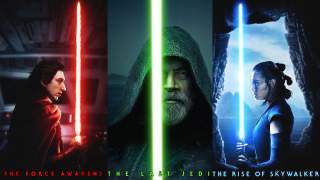Star Wars Question: Why Are These Sci-Fi Classics Told as a Trilogy?
We have all the answers.
How many Star Wars films did George Lucas plan? According to Dan Golding in his recent book Star Wars After Lucas, this depends on when Lucas was asked.
The often-quoted number is nine, but it might wind up being as many as 12. How ever many he planned, we know he planned them in threes.
Today’s release of The Rise of Skywalker, directed by J.J. Abrams, marks the end of the third trilogy in the franchise.
But where does the trilogy story form come from?
Changing the world
Trilogy is a very old form. The earliest known example is Aeschylus’ Oresteia, which tells a story of revenge and change in law following Agamemnon’s return home from the Trojan war. It was first performed in Athens 2500 years ago.
In the first play, Agamemnon is murdered by his wife Clytemnestra as revenge for the sacrifice of their daughter. In the second play, their son Orestes murders his mother, to avenge his father’s death.
In the final play of the trilogy – with no more family members remaining to avenge Clytemnestra’s death – Orestes is put on trial in front of an Athenian jury. Also the first ever courtroom drama, Aeschylus used this third play to twist the story world set up in the first two plays.
A hallmark of the trilogy genre is the shift in the final part, with a revolution (as in The Hunger Games) or a restoration (as in Isaac Asimov’sFoundation). In linking three individual texts, there is a fourth, monumental, overarching story.
Read more: How JJ Abrams ruined Star Trek and what that means for Star Wars: The Force Awakens
In the first two Star Wars trilogies, we followed Luke Skywalker’s journey to becoming a Jedi (Episodes IV-VI) and Anakin Skywalker’s journey to the Dark Side (Episodes I-III).
The current trilogy (Episodes VII-IX), so far, has expanded this overarching narrative even further: a hero’s journey in Rey, mimicking Luke’s journey to becoming a Jedi; and an anti-hero’s journey as Kylo Ren following the same path as Anakin.
Planned and unplanned
Trilogies can be “planned” or “unplanned”: did the creator have a trilogy in mind all along, or was it conceived on a sequel-by-sequel basis?
There is a crucial difference in viewing the trilogy from a creative point of view, and an industrial one. Even if results might not be what you would expect.
Christopher Nolan talks about The Dark Knight Trilogy as unplanned: devised as they went, sequel by sequel. Over the three films, Nolan was able to craft a unifying story about Bruce Wayne becoming Batman and then learning to give up the mantel.
The Wachowski’s The Matrix was always planned as a trilogy – but the first film was released well before the sequels were funded. Although this trilogy was planned, the sequels failed to replicate the success of the first: an unsatisfactory ending which didn’t stand up to the promise of the first film.
The danger of an unplanned trilogy is once a film is released its story cannot be changed, and so the filmmakers are not always able to find the balance between the three single stories and the overarching story. A frequent trap is that the first film can fully stand alone, but the second and third films feel like a single, two-part film.
What makes a good film trilogy is sometimes difficult to determine or predict. But each film in a trilogy must stand on its own - yet the three must work together as a whole.
It all ends
The original Star Wars trilogy concluded with the fall of The Galactic Empire and restoration of the Jedi Order. In Episodes I-III, the Old Republic and Jedi Order faced revolution, replaced with The Empire and The Sith.
The latest films have subverted expectations of a Star Wars trilogy. Old favourites have passed, a Jedi’s faith has been disturbed, Rey’s parents are still unknown.
If we follow trilogy lore, and especially Star Wars trilogies, we can expect a world order to fall. Will it be the First Order or The Resistance? Or will balance finally be restored to the force?
No matter how it concludes, perhaps the most crucial question is: can J.J. Abrams pull off a satisfying end to the current Star Wars trilogy?
Will the third film in the third trilogy make it third time’s a charm?
![]()
Stefanie Johnstone, PhD Candiate, University of Technology Sydney
This article is republished from The Conversation under a Creative Commons license. Read the original article.
Image: The Force Awakens

